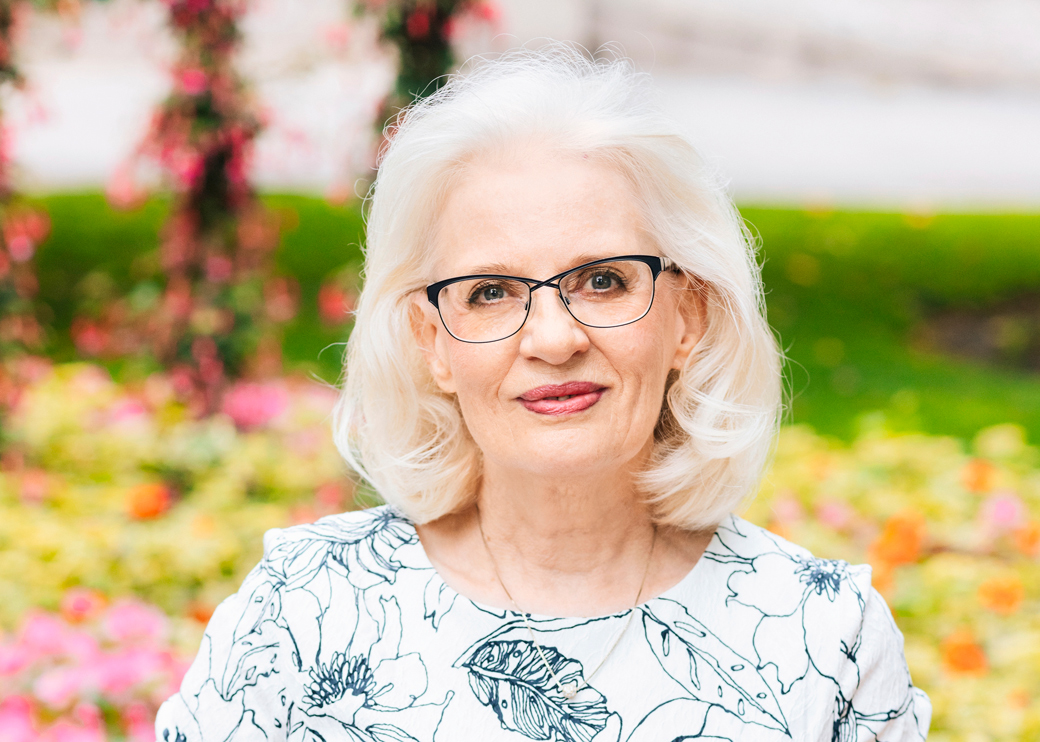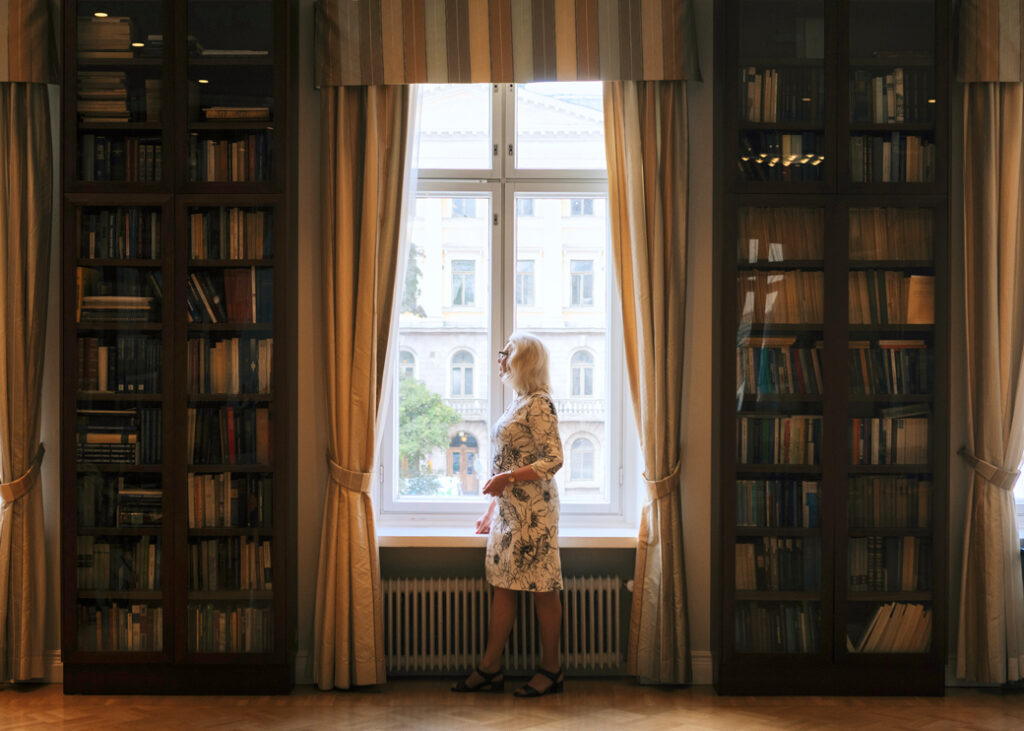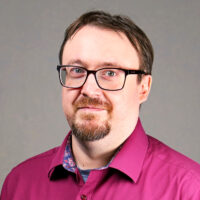
Tuula Linna: “The post-truth era belongs in no society”
President of the Finnish Academy of Science and Letters Tuula Linna believes in the advancement of free and independent science. She is pleased by the foothold gained by sustainable development in research. Along with striving for fact-based information, science must defend life. At the same time, she is concerned by many phenomena whittling away at…
texti minna hiidensaari images vilja harala english translation marko saajanaho
“The greatest challenges faced by science are related to limited researcher positions and competition for funding. Obtaining funding and leading research just as a human resources function has become enormously important. Some researchers are frustrated by the need to hunt for funds, others simply consider it part of the job.”
University of Helsinki Professor of Procedural Law Tuula Linna has witnessed the trajectory of changes in the academic world in her lengthy career. Changes in the research environment are both positively and negatively charged. Since the start of this year, Linna has served as the President of the Finnish Academy of Science and Letters. Established in 1908, the general scientific society offers 2.5 million euros annually as grants, especially to younger researchers. Many researchers find their professional career stalling or taking off based on funding.
“It is also problematic how there are no professorships available to people with long and illustrious research and teaching careers. Retiring from a university lecturer position has become more common.”
Linna highlights the importance of allowing research-intensive periods free from teaching and administrative work to ensure proper focus on research topics. She also remarks that writing textbooks takes time as well. However, limited funding remains an issue here.

One phenomenon with distorting effects on science is that even though higher education institutions are theoretically autonomous in terms of internal budget allocation, the current funding model favours a low-risk approach whilst narrowing research investment down to profitable activity. Increasing the number of students also leads to unhealthy traits.
“Even with some faculties already on the brink because of poor teacher–student ratios, every university is trying to add more students because everyone else is.”
The planned higher education institution funding model reform is very much needed as far as Linna is concerned.
“It is great to see the Ministry of Education and Culture have their guidance activity assessed. An international report on the Ministry’s higher education institutions’ guidance and funding practices, which was finished in 2023, determined that the current model mostly steers towards uniformity and competition rather than specialisation and cooperation. The funding direction was also seen as performance-focused from a global perspective and conservative in terms of effects.
Science changes with society
Linna has also observed positive progression in the relationship between society and science, with wider interest in scientific research than before.
“Researchers have got to – and also had to – step out of their science chambers. They are being heard and interviewed.”
The flipside of this interest from traditional and social media is researchers becoming targeted when topics such as religions, vaccines, immigration, or equality are discussed.
“This is a harmful development universities need to seriously address just from an occupational safety standpoint.”
”Tutkijat ovat saaneet, mutta myös joutuneet astumaan ulos tutkijankammiostaan. Heitä kuullaan ja haastatellaan.”
One of the most significant things changing the research environment is artificial intelligence.
“I believe it will become one of the researcher’s best tools. Especially in the digital and green transition, AI plays a major role. In addition to collecting, filtering, and categorising data, AI can help create outlines for innovations.”
The risks of this development must be considered, however.
“Scientific control is everything, whether it is big data or the researcher’s own empirical data. The demands of the scientific method are not going to disappear.”
Linna also reminds us that we must remember the importance of analogue material such as paper documents and printed books in this AI transition period.
“It might not be current anymore, but prior analogue material forms a background, a historical continuity context, and reference material to verify changes.”
The double-edged sword of societal impact
In a pleasing development, the amount of science advice and knowledge brokering has increased. Linna points out the Sofi project from 2019–2021, a joint venture between the Finnish Academy of Science and Letters, the Finnish Society of Sciences and Letters, the Finnish Academy of Technical Sciences, and the Svenska Tekniska Vetenskapsakatemin i Finland. The project was created to develop science advice with Ministry of Education and Culture funding and was so successful that the Finnish Academy of Science and Letters took science advice development under its wing after the project’s conclusion.
In the project, scientific sparring has been carried out in six ministries on topics such as environmental impact assessment, fossil-free transportation, and the Nature Conservation Act update. However, the two sides of the coin show themselves in whether or not researched data is used as a basis for political decision-making. Just recently, Linna has noticed policymaking being steered politically as early as the working group phase, at which point only unbiased information is meant to be collected.
“Policymakers largely appreciate researched data.”
Linna herself has frequently visited the Legal Affairs Committee and others to share her information.
“On the other hand, scheduling pressures and a lack of resources in policymaking can hamper the use of researched data.”
New information increases understanding
Linna believes all levels of science in Finland strive to promote the advancement of free and independent science and fact-based information. The so-called post-truth era, leaning heavily on emotions and opinions at the cost of facts, is dubious as far as Linna is concerned.
“The post-truth era belongs in no society and goes completely against the whole humankind’s efforts so far.”
She reckons that while striving for verifiable information is a shared goal, the point of emphasis may vary across the scientific community depending on what kind of research is considered valuable and useful.

“The foundation of the Finnish Academy of Science and Letters is valuable science, which means appreciating and respecting the efforts and results of every field. The perspective of the human mind is too narrow to assess when something may become useful. All new information leads to a better understanding of our planet.”
Sustainable development as a value and goal has penetrated all fields.
“This is an absolute necessity.”
At the same time, we must remember that sociocultural sustainability is also sustainable development. “All research is based on the civilisation and culture of nations, understanding the world, and respecting fellow humans and the environment, whether it manifests as particle research, legal analysis, or study of literature and art.”
Patience required
Linna is pleased by the RDI Act’s stated objective of increasing the portion of research and development spending to four percent of the GDP.
“Even though the timespan of the act is seven years, I hope government funding decisions are not made hastily. Patience is required. Investment in basic research is realised as applicable results and innovations on a delay. There must be acceptance of the fact not all science leads to applications or can be turned into commercial goods or services in the short term.”
“We must also see the value humaniora has as the nutrient for the nation’s civilisation and culture, from which everything grows.” Indeed, the lack of the words ‘civilisation’
(Translator’s note: ‘sivistys’ in the original text), ‘culture’, and ‘art’ in the RDI Act’s rationale is concerning to Linna.
In Linna’s view, companies should consider investing in humanistic and social sciences not just from image and brand benefits, but also to build an ethical code in relation to their staff.
“If a company works to facilitate sustainable development and science in its production and preceding value chains, one might imagine it would be appreciated by the modern consumer, who is highly aware and requires transparency.”
“Even though the timespan of the act is seven years, I hope government funding decisions are not made hastily. Patience is required.“
Linna finds the abolishment of the Government’s analysis, assessment and research activities (VN TEAS) unfortunate.
A VN TEAS project published in June calculated that Finland will not meet its carbon neutrality goal by 2035 with the current actions. The calculation is called ‘Baseline scenarios for energy and climate policy package towards zero emissions’. The results of the project are used in the government’s energy and climate strategy, so these calculations have their justifiable place.
“The need for extra measures is clear”, Linna states.
The many opportunities to facilitate business cooperation
Amidst the systematic decrease in research positions, the government’s ‘one thousand doctors’ pilot project offers a measure of hope.
“This 255-million-euro pilot, quite clearly aimed at Academy of Finland flagship projects, might provide a boost for building bridges between research and business in the long term as well. However, I am rather worried about some of the doctoral theses being unfinished when the funding stops. We need to consider the post-doc continuation for these researchers in advance.”
According to Linna, research and business cooperation should generally be facilitated at all levels, of course without risking scientific freedom and independence. Currently, businesses make up roughly four percent of all funding for higher education institutions. For state research institutes, the share is higher at roughly thirteen percent.
Linna has several suggestions for increasing business cooperation.
“The research subject should be one that corresponds with the business strategy and investment programme in a suitable timeframe. One example is the sustainable hydrogen technology research at the University of Oulu. It would also be excellent if businesses, as industry partners, could cooperate with research parties to form international consortiums free of competition, because great challenges require extensive cooperation. We also need registries to compile information about existing studies to make use of their results. In Finland, this is still in its infancy.”
“Researchers should also be hired in production roles.”
Researchers could also be heard as consultants to achieve ESG objectives (Environmental, Social, and Governance).
“Researchers should also be hired in production roles.”
At the same time, it is important to ensure the intellectual property rights to the study results are resolved between all parties. Linna is aware of cases leading to conflict.
“All of this should be very clear.”
The useful lateral move of the happy professor
Linna herself is no stranger to balancing between teaching, research, administrative work, and writing. An interest in social decision-making and use of authority inspired the Kuusamo-born Linna to apply to study law in Turku. The field immediately seemed to be made for her. Linna, who describes herself as a basic achiever, noticed she was especially adept at writing.
Professor Eero Backman recognised the talent of the student who wrote her master’s thesis on consumer protection crimes and suggested she apply for an assistant position. She then moved from the position of senior assistant to the Ministry of Justice, where she spent twenty years.
Linna has always been a prolific writer.
“The Debt Enforcement Code was largely written by me.”
The lateral move to the ministry has been a tremendous help on Linna’s academic career.
”There is very little job rotation in academia. Return routes should be considered to enable it.”
“There is very little job rotation in academia. Return routes should be considered to enable it.”
Linna transitioned from her career as an official to academia when the University of Lapland invited her to a professorship. From Rovaniemi, she applied for a position at the University of Helsinki.
“The freedom and boundlessness of science motivate me. I have really enjoyed my time as a professor.”
Linna has studied themes of sustainability in procedural law for years. For example, how to implement the green transition in insolvency situations, and who carries the environmental responsibility when a business goes bankrupt.
“These questions involve a variety of tensions and conflicted interests, which are intriguing to solve through research.”
This autumn, Linna will finish her book Siviiliprosessi 2 (Civil Procedure 2). She also plans to continue writing into the next year. At the start of the year, a new phase as Professor Emerita begins.
Linna, who has also served in multiple specialist and confidential roles, tries to shush us out of modesty as we mention her awards as a teacher.
At the same time, she highlights a related concern. According to studies, over fifty percent of students experience mental issues especially in terms of coping.
“Many are downright depressed. Young people today carry concern and responsibility for climate change, and wars add mental stress on top of personal challenges regarding studies, livelihood, and relationships. We have plenty of young potential researchers, and we must take better care of their wellbeing. Every professor can do their part when they meet students, in the spirit of respectful interaction.”
Tuula Linna, Doctor of Law
Born: 1957 in Kuusamo, Finland
Work: Criminal Law and Procrdural Law Assistant and acting Senior Assistant at the University of Turku. Academy of Finland junior researcher. Ministry of Justice Counsellor of Legislation, fixed-term and part-time Professor of Procedural Law at the University of Eastern Finland. Professor of Procedural Law at the University of Lapland. University of Helsinki Professor of Procedural Law at the University of HelsinkiFamily: Three adult children, three grandchildren.
Family: Three adult children, three grandchildren.

